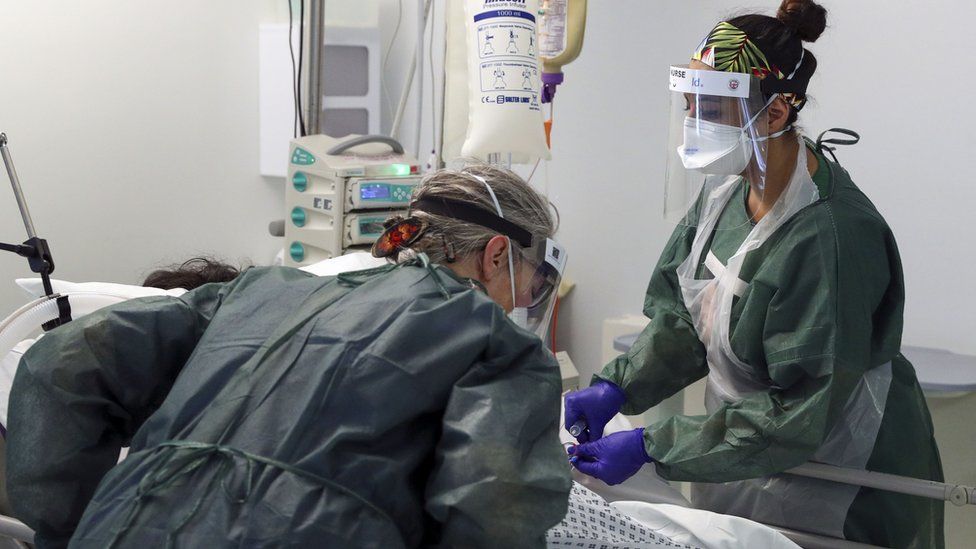Coronavirus: Nurses' leaders urge 'care for those who caring'
- Published

Nurses' leaders want all healthcare employers - including the NHS - to "care for those who have been caring" during the coronavirus crisis.
The Royal College of Nursing (RCN) is calling for better risk assessments; working patterns and mental health care for those on the front line.
It warns many may be suffering from exhaustion, anxiety and other psychological problems.
The Department of Health and Social Care said support was a "top priority".
The RCN has released an eight-point plan of commitments it wants to see enforced to mark the 100 days since the World Health Organization (WHO) declared a pandemic.
Amongst its suggestions are a better Covid-19 testing regime for healthcare workers and more attention paid to the risks posed to ethnic minority nurses.
It says employers and ministers "must tackle the underlying causes which have contributed to worse outcomes for Bame staff".
The RCN also wants a commitment that no nurses will be pressured into working if they do not feel they have the right personal protective equipment for their jobs.
And it wants more done too to avoid long shifts and excess hours as well as measures to protect annual leave and work breaks.
Above all, the union is asking for proper funding for the mental health counselling that may be needed to support staff who've had traumatic experiences on Covid-19 wards and in care homes.
It points out even those who work in other areas may be affected by work-related stress as backlogs from disrupted services mount up.
Anxiety and PTSD
Last month, an Icon/ King's College London survey of members of the nursing and midwifery workforce found that 88% continue to worry about risks to family members during the pandemic.
Respondents also reported ongoing depression, anxiety, stress and emerging signs of post-traumatic stress disorder.
Dame Donna Kinnair, the RCN's general secretary, said: "The weekly clapping may have stopped, but the practical measures needed to fully support our health care staff are only just beginning.
"It is vital that our governments and employers, including the NHS, take steps now to protect our health and social care services and staff, who have done such remarkable work at a time of crisis."
The Department of Health and Social Care said the whole country recognised the "bravery of everyone working on the frontline of this unprecedented global pandemic" and it would "continue to do everything we can to support them, including ensuring that their mental health and wellbeing is a top priority".
It said all NHS staff have free access to helplines and wellbeing apps, and urged anyone struggling to call them, or speak to a colleague or their occupational health team.
During the peak of the epidemic in the UK, many commentators said there should be a "never again" approach to the health service and social care sector - similar to the founding of the welfare state following WW2.
But the medical professional bodies worry that society will return normal without the support they say is crucial for healthcare staff.
- SCHOOLS: When will children be returning?
- EXERCISE: What are the guidelines on getting out?
- THE R NUMBER: What it means and why it matters
- AIR TRAVELLERS: The new quarantine rules
- LOOK-UP TOOL: How many cases in your area?
- Published14 May 2020
- Published12 May 2020
- Published23 April 2020